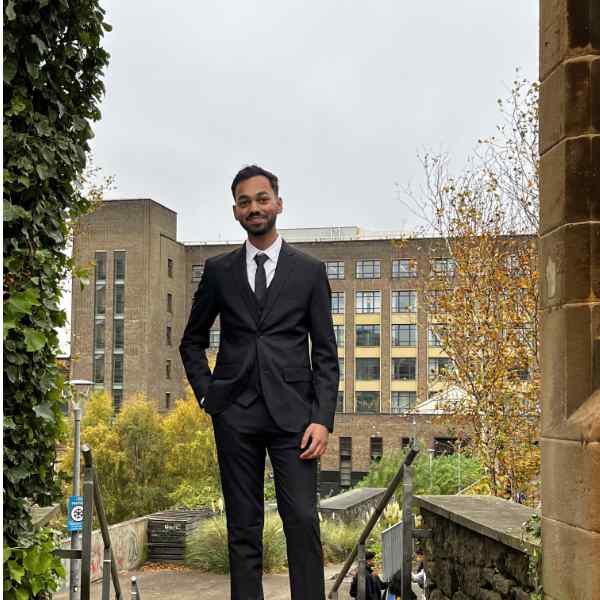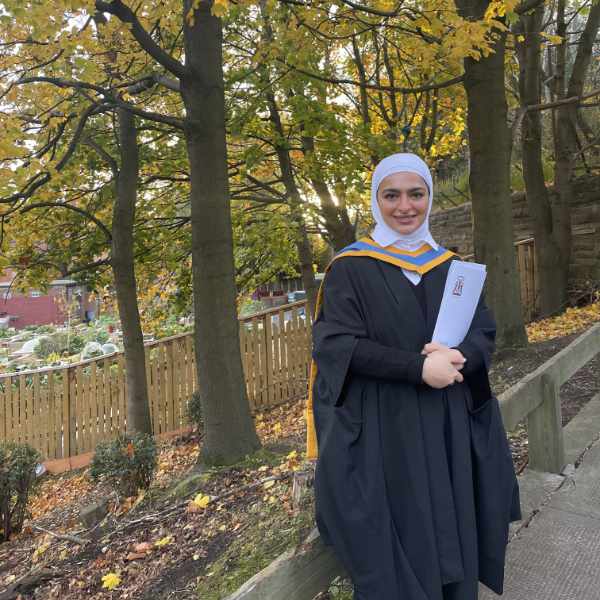MSc Advanced Pharmacology
ApplyKey facts
- Start date: September
- Study mode and duration: 12 months full-time
Study with us
Studying our MSc in Advanced Pharmacology you'll receive the highest-quality teaching in the leading Strathclyde Institute of Pharmacy & Biomedical Sciences by staff dedicated to your personal and scientific development.
- underpinned by our strong research base, links with industry, the NHS and international partners
- study how drugs and other chemicals affect the functions of the body
The Place of Useful Learning
UK University of the Year
Daily Mail University of the Year Awards 2026
Scottish University of the Year
The Sunday Times' Good University Guide 2026
Why this course?
This degree is for those who want to specialise in a single biomedical sciences option at Masters level. The MSc Advanced Pharmacology will provide you with a comprehensive three-part science training module.
Firstly, unlike many Masters courses, we offer you dedicated training in a broad suite of practical laboratory skills.
Secondly, this is complemented by two unique classes that develop your transferrable skills in statistics, presentations, career development, and ethics, as well as honing your science writing skills and your ability to design experiments and analyse sophisticated datasets.
Thirdly, our taught classes capture the excitement of cutting-edge research fields and you'll be taught by active researchers or practising clinical professionals.
A choice of classes allows you to select a pathway to suit your future aspirations. The programme has a special focus on how drugs and other chemicals affect the body in health and disease. You'll explore the development of new and improved medicines and the treatment of disease.


Chat to a student ambassador
Want to know more about what it’s like to be a Science student at the University of Strathclyde? A selection of our current students are here to help!
Our Unibuddy ambassadors can answer all your questions about courses and studying at Strathclyde and offer insight into their experiences of life in Glasgow and Scotland.
What you'll study
Studying a combination of compulsory and optional classes and a research project, you'll gain vital transferable skills in statistics, communication, ethics, science writing and critical analysis of data. In addition, you'll undertake:
- two semesters of postgraduate laboratories, giving you the practical abilities & interpretational skills that will prepare you for your project & future career
- optional classes in in vivo biology or drug discovery
- a compulsory Pharmacology class followed by a choice of either Clinical Pharmacology or Applied Pharmacology
- a summer research project in an active research laboratory
Teaching staff
The following staff are all involved in the teaching and research project supervision on the MSc Advanced Pharmacology (project availability may vary year-to-year).
| Staff member | Research expertise |
|---|---|
| Dr Margaret Rose Cunningham |
Dr Cunningham’s field of expertise is G protein-coupled receptor (GPCR)-dependent regulation of cardiovascular function with particular interest in proteinase-activated receptors (PARs) and purinergic receptor families. Dr Cunningham’s research involves investigating the molecular mechanisms of GPCR involvement in the processes that underpin platelet and vascular cell function and anti-cancer therapy-induced cardiotoxicity. In Strathclyde Institute of Pharmacy & Biomedical Sciences, Margaret co-leads the Cardiovascular and Metabolic Diseases research group with Dr Susan Currie. |
| Dr Kathryn McIntosh |
Dr McIntosh’s research interests lie in the area of GPCRs, focussing on Proteinase activated receptors (PARs). In particular she is interested in the pharmacology of PAR2 and its pathophysiological role in inflammatory disease. Specifically investigating chronic inflammatory disorders such as rheumatoid arthritis and latterly the role of PAR2 in cancer, looking at prostate and breast cancer cell models. |
| Dr Paul Coats |
Dr Coats is an active researcher within cardiovascular research in SIPBS. His research focus is vascular physiology (health) and pathophysiology (disease). The studies of both large and small blood vessels are core to the research. |
| Professor Robin Plevin | Professor Plevin’s laboratory studies aspects of signalling in relation to inflammation, vascular disease and cancer. The lab has strong collaborations both internally, nationally and internationally. A strong emphasis on career development is one of the features of this laboratory. |
Course content
Our aim is to provide you with classes that present the cutting-edge of our subject area, delivered using exciting and engaging teaching methods matched to the needs of postgraduate-level students. Please feel free to contact us if you want further details in the meantime.
Compulsory classes
Essential Skills and Employability for Masters Students (20 credits)
Refine your core skills in statistics, data presentation and career development while also learning about the ethical choices and dilemmas that you might face in your scientific careers.
Entrepreneurship (10 credits)
Learn from experts from the Hunter Centre for Entrepreneurship, what it takes to translate bright ideas in biomedical sciences into patents, business plans and spin-out companies.
Postgraduate Studies in Pharmacology (20 credits)
In this module, you'll study cutting-edge research on adverse drug reactions, chemotherapy, malaria treatment, bacterial and viral chemotherapy, and gastrointestinal disorders. Learning will be achieved through lectures, tutorials and workshops.
Advanced Techniques in Biomedical Research 1 (10 credits)
This is a two-semester compulsory laboratory module. Both modules will help develop your skills in data analysis and report writing. This will help pave the way for a smooth transition into your summer research project, Advanced Topics in Biomedical Research.
This first module, which is delivered in the first semester will provide you training in key research skills in a range of standard techniques to be applied to specific problems in molecular biology research.
Elective modules
Choose one of two elective practical modules offered across the first and second semesters.
In Vivo Biology (10 credits)
Gain real practical experience in the safe and ethical application of in vivo research by being trained to Home Office Personal License standard. Discover how in vivo biology has driven the development and testing of new drugs and medical techniques that save and improve human lives.
Compulsory modules
Advanced Techniques in Biomedical Research 2 (10 credits)
This is the second part of the two-semester compulsory laboratory module. This module will expose you to various assay procedures used widely in biochemistry, pharmacology, microbiology and immunology fields through hands-on laboratory exercises and further develop your analytical skills through workshops.
Advanced Topics in Biomedical Research (20 credits)
A unique and innovative module designed with three outcomes in mind:
- become an expert in the field that you'll study for your summer research project & learn how to write a review paper that aims to be publication quality
- learn how a scientific research career really works from the experts & then write the outline of a hypothetical research grant application
- enhance your teamwork on a virtual project to develop a hypothetical drug from high-content screen, through in vivo testing in models, to transcriptomics & human clinical trials & pharmacogenomics. You'll not only learn how to manage a project’s timelines & targets, but also enter the world of big data manipulation and analysis
Postgraduate Studies in Clinical Pharmacology (20 credits)
The aims of this module are:
- to develop understanding of neurodegenerative disorders & the common themes of protein aggregation & inflammation in the brain
- to develop understanding of the pharmacological control of global activity within the nervous system: epilepsy, anaesthesia & analgesia, use of sedatives & hypnotics
- to develop understanding of psychiatric disorders
- to develop understanding of drug dependence
- to develop understanding of endocrine disease & oral contraceptives
Elective modules
Choose one of two elective practical modules offered across the first and second semesters.
Drug Discovery (10 credits)
The aim of this module is to introduce you to practical skills required to set up robust drug discovery assays in both academic and industrial settings. The pathway from pathology or biological pathway to small molecule drug candidate is explored in this unique module. Become familiar with the modern laboratory assays and screening approaches used by Big Pharma to develop their blockbuster drugs.
60 credits
Choose from a selection of research project topics on exploring adverse drug reactions, chemotherapy, malaria treatment, and gastrointestinal disorders. You can choose from four type of projects:
Laboratory-based experimental projects
These aim to develop a range of skills required for performing experimental research in a laboratory and generating novel data. The type of skills acquired are project-specific. These projects are appropriate if you're interested in a career in experimental laboratory research in industry or academia, e.g. PhD/research assistant/biology-based industrial company, where lab skills are of importance.
Critical analysis
These aim to develop a range of skills required for carrying out analysis of data reported in scientific literature. Skills include finding appropriate peer-reviewed studies, critically analysing the methods used and the data presented and coming to a clear conclusion whether the data support or refute a hypothesis. These projects develop skills in reading technical literature, formulating hypotheses, synthesising and critically appraising information and developing new ideas.
Data analysis
These aim to develop a range of skills required for carrying out analysis of scientific data. This could be data previously generated in the supervisor’s laboratory or data collected from previously published literature. They may involve generating and using spreadsheets and specialist data analytical packages. These projects develop skills in working with data, using statistical analyses, creating models, critically appraising information and developing new ideas.
Data-mining
These aim to develop a range of skills required for carrying out analysis of scientific data present in databases, e.g. genomic sequences. They may involve using spreadsheets and specialist data analytical packages. These projects develop skills in working with databases, data, using statistical analyses, creating models, critically appraising information and developing new ideas.
Learning & teaching
The course is delivered through lectures, tutorials and hands-on practical sessions.
If you successfully complete the required taught classes, you can go on to take a research project for the MSc.
Assessment
Assessment of taught classes is through the following:
- multiple choice tests
- computer quizzes
- problem solving scenarios
- poster & oral presentations
- essays
- formal written exams
The laboratory project is assessed through a written thesis.

I have gained expertise in laboratory procedures, as well as developed skills in scientific writing, critical analysis of literature and statistical analysis. What else can a scientist ask for?
MSc Advanced Pharmacology student
Entry requirements
| Academic requirements | Minimum second-class (2:2) honours degree, or overseas equivalent, in a biological or chemical discipline. |
|---|---|
| English language requirements | You must have an English language minimum score of IELTS 6.0 (with no component below 5.5). We offer comprehensive English language courses for students whose IELTS scores are below 6.0. Please see ELTD for full details. As a university, we now accept many more English language tests other than IELTS for overseas applicants, for example, TOEFL and PTE Cambridge. View the full list of accepted English language tests. |
Pre-Masters preparation course
The Pre-Masters Programme is a preparation course held at the University of Strathclyde International Study Centre, for international students (non-UK/Ireland) who do not meet the academic entry requirements for a Masters degree at University of Strathclyde.
Upon successful completion, you'll be able to progress to this degree course at the University of Strathclyde.
Fees & funding
All fees quoted are for full-time courses and per academic year unless stated otherwise.
Fees may be subject to updates to maintain accuracy. Tuition fees will be notified in your offer letter.
All fees are in £ sterling, unless otherwise stated, and may be subject to revision.
Annual revision of fees
Students on programmes of study of more than one year (or studying standalone modules) should be aware that the majority of fees will increase annually.
The University will take a range of factors into account, including, but not limited to, UK inflation, changes in delivery costs and changes in Scottish and/or UK Government funding. Changes in fees will be published on the University website in October each year for the following year of study and any annual increase will be capped at a maximum of 10% per year. This cap will apply to fees from 2026/27 onwards, which will not increase by more than 10% from the previous year for continuing students.
| Scotland | £12,550 |
|---|---|
| England, Wales & Northern Ireland | £12,550 |
| Republic of Ireland |
If you are an Irish citizen and have been ordinary resident in the Republic of Ireland for the three years prior to the relevant date, and will be coming to Scotland for Educational purposes only, you will meet the criteria of England, Wales & Northern Ireland fee status. For more information and advice on tuition fee status, you can visit the UKCISA - International student advice and guidance - Scotland: fee status webpage. Find out more about the University of Strathclyde's fee assessments process. |
| International | £32,900 |
| Available scholarships | Take a look at our scholarships search for funding opportunities. |
| Additional costs | Course materials You will have to pay extra for your lab coat and safety goggles. All recommended textbooks are available in the library (and some freely available as online resources). However you may wish to purchase your own copies. Other costs There are returnable deposits for entry keycards and lockers (depending on your project location within Strathclyde Institute of Pharmacy & Biomedical Sciences). International students If you are an international student, you may have associated visa and immigration costs. Please see student visa guidance for more information.
|
Please note: the fees shown are annual and may be subject to an increase each year. Find out more about fees.
Our students

Aaman Sayyed
Studying in Glasgow has been an incredible experience, exposing me to advanced research techniques and new perspectives. I'm excited to apply what I've learned in meaningful ways and make a positive impact in the pharmaceutical world!

Eman Mshari
In addition to the taught material, the course helped me become a better researcher. I have acquired the necessary skills for conducting research, including experimental design, data analysis, and interpretation, which are all fundamental components in this field.

Tabish Taji
The University’s emphasis on practical education, alongside a rich learning environment, provided me with the ideal setting to develop my skills and gain in-depth knowledge in pharmacology and biomedical sciences.
How can I fund my course?
Scottish postgraduate students
Scottish postgraduate students may be able to apply for support from the Student Awards Agency Scotland (SAAS). The support is in the form of a tuition fee loan and for eligible students, a living cost loan. Find out more about the support and how to apply.
Don’t forget to check our scholarship search for more help with fees and funding.
Students coming from England
Students ordinarily resident in England may be to apply for postgraduate support from Student Finance England. The support is a loan of up to £10,280 which can be used for both tuition fees and living costs. Find out more about the support and how to apply.
Don’t forget to check our scholarship search for more help with fees and funding.
Students coming from Wales
Students ordinarily resident in Wales may be to apply for postgraduate support from Student Finance Wales. The support is a loan of up to £10,280 which can be used for both tuition fees and living costs. Find out more about the support and how to apply.
Don’t forget to check our scholarship search for more help with fees and funding.
Students coming from Northern Ireland
Postgraduate students who are ordinarily resident in Northern Ireland may be able to apply for support from Student Finance Northern Ireland. The support is a tuition fee loan of up to £5,500. Find out more about the support and how to apply.
Don’t forget to check our scholarship search for more help with fees and funding.
International students
We've a large range of scholarships available to help you fund your studies. Check our scholarship search for more help with fees and funding.
International students
We've a thriving international community with students coming here to study from over 140 countries across the world. Find out all you need to know about studying in Glasgow at Strathclyde and hear from students about their experiences.

Careers
After graduating, you'll be ideally qualified for positions in biomedical and pharmaceutical industries, as well as hospitals and universities.
This course provides the background training for a career in:
- clinical pharmacology
- pharmaceutical & biotechnology industry laboratory research posts
- laboratory technical support
- medical/pharmaceutical/life science sales
Alternatively, you may wish to continue studies for an MPhil or PhD.
Apply
There is currently no deadline for submitting applications. However, we encourage you to apply early as we consider applications on a first come, first served basis, and may introduce an application deadline due to high demand.
Start date: Sep 2026
Advanced Pharmacology
Contact us
Glasgow is Scotland's biggest & most cosmopolitan city
Our campus is based right in the very heart of Glasgow. We're in the city centre, next to the Merchant City, both of which are great locations for sightseeing, shopping and socialising alongside your studies.
Have you considered?
We've a range of postgraduate taught and Masters courses similar to this one which may also be of interest.

